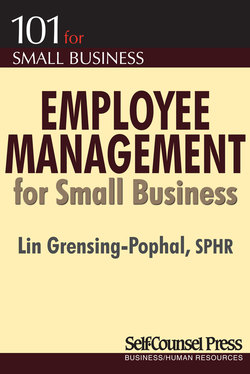Читать книгу Employee Management for Small Business - Lin Grensing-Pophal - Страница 49
На сайте Литреса книга снята с продажи.
2.4h Disabilities
ОглавлениеThe Americans with Disabilities Act (ADA) Amendments of 2008 became effective in January, 2009. The original Act (1990) makes it unlawful to discriminate in employment against a qualified individual with a disability and includes such employment practices as recruitment, hiring, firing, training, job assignments, promotions, pay,benefits, layoffs, and leaves. Private employers, state and local governments, employment agencies labor organizations and labor-management committees are covered by the law. If they had 25 or more employees after July 26, 1992 and 15 or more employees after July 26,1994.
The ADA defines a disability as a physical or mental impairment that limits one or more major life activities. A major life activity includes walking, sitting, learning, caring for oneself, etc. To determine if such an impairment exists, the following factors need to be evaluated: the nature and severity of the impairment, the duration or expected duration, and whether or not there will be a permanent or long-term impact.
Major impacts of the 2008 amendments include, according to the www.eeoc.gov website:
• An expansion of the definition of “major life activities” by including two non-exhaustive lists. The first list includes many activities that the EEOC has recognized (e.g., walking) as well as activities that EEOC has not specifically recognized (e.g., reading, bending, and communicating). The second list includes major bodily functions (e.g., “functions of the immune system, normal cell growth, digestive, bowel, bladder, neurological, brain, respiratory, circulatory, endocrine, and reproductive functions”).
• An indication that mitigating measures other than “ordinary eyeglasses or contact lenses” shall not be considered in assessing whether an individual has a disability (so, for instance, an epileptic who has successfully controlled his or her seizures through medication for several years would still be considered to have a disability).
• Clarification that an impairment that is episodic or in remission is a disability if it would substantially limit a major life activity when active.
• A change to the definition of “regarded as” so that it no longer requires a showing that the employer perceived the individual to be substantially limited in a major life activity, and instead says that an applicant or employee is “regarded as” disabled if he or she is subject to an action prohibited by the ADA (e.g., failure to hire or termination) based on an impairment that is not transitory and minor.
• An indication that individuals covered only under the “regarded as” prong are not entitled to reasonable accommodation.
The EEOC will be evaluating the impact of these changes. For employers, the key points to remember are that employer cannot discriminate against an applicant on the basis of that person’s disability unless the employer can demonstrate that the disability would adversely affect the person’s ability to perform the job.
The typical statute or ordinance requires that employers not take adverse action against a disabled employee if “reasonable accommodation” can be made to allow the employee to perform his or her job. Such reasonable accommodation may include providing special equipment, modifying work hours, or allowing for work to be done at home.
The employer is not required to create a new job, substantially change the old one or the working conditions, or spend undue sums of money to accommodate a disabled employee. Obviously these guidelines are extremely subjective as there has been (and will continue to be) a great deal of litigation surrounding this issue. The resultant case law will eventually provide more distinct guidelines for employers dealing with issues of disability in the workplace.
In terms of dealing with questions related to candidate’s disabilities, a simple way to determine whether you can ask a question is to focus on issues that directly affect the candidate’s ability to perform the job. Whether dealing with physical disability, age, sex, or other protected areas, it is always permissible to ask applicants if they have any condition that would prevent them from performing the job. Keep in mind that these questions must be asked of all candidates. Further, these questions should be followed up with inquiries about what type of special accommodations would need to be made should this employee be hired.
Don’t ask, “Do you have a disability?” Do ask, “Do you have any impairment that would keep you from performing the requirements of this job?”
